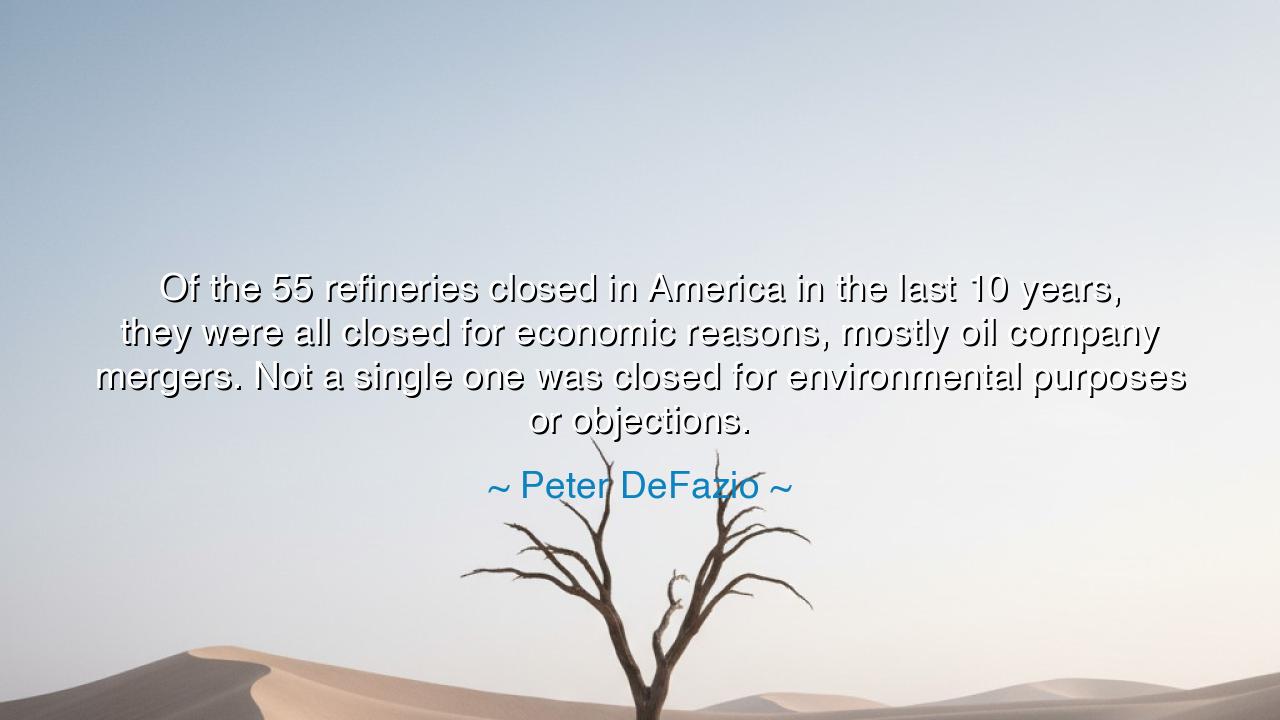
Of the 55 refineries closed in America in the last 10 years, they
Of the 55 refineries closed in America in the last 10 years, they were all closed for economic reasons, mostly oil company mergers. Not a single one was closed for environmental purposes or objections.






The words of Peter DeFazio, “Of the 55 refineries closed in America in the last 10 years, they were all closed for economic reasons, mostly oil company mergers. Not a single one was closed for environmental purposes or objections,” strike with the weight of revelation, cutting through the fog of illusion. They remind us that the stories told by the powerful often mask the true forces at work. Many claim that environmental laws strangle industry, that regulations are the enemy of prosperity. Yet here DeFazio lifts the veil: it was not the environment, nor the cries of the people for clean air and water, that closed these refineries—it was the hand of economics, the consolidations of mighty corporations, the pursuit of profit through mergers and efficiency.
The origin of this saying lies in the political battles over energy policy in the United States. For decades, industry leaders argued that environmental protections endangered the supply of gasoline, that the demands for cleaner air, safer water, and reduced emissions forced refineries to close. DeFazio, a congressman known for his candor, revealed this as myth. The closures of 55 refineries were not the work of environmental law but of economic strategy. Oil companies, seeking greater control and profit, merged and consolidated operations. The people were told one story, but the truth was another.
History has seen this pattern before. In the Great Depression, factories across America closed their doors—not because workers demanded safer conditions or environmental reform, but because the collapse of the financial system left them without buyers for their goods. Yet even then, business leaders often blamed government or labor for their losses, seeking to protect their image. DeFazio’s words echo this timeless truth: those who control the engines of industry often point outward in blame, while the true causes lie in their own pursuit of gain.
The deeper meaning of his statement is this: we must look with clear eyes at the forces that shape our world. Economics, not environmental protection, drives most decisions of industry. The closure of a refinery is not an act of compassion for the earth, but of calculation for profit. To believe otherwise is to be deceived, to allow false narratives to sway our understanding of justice and responsibility. DeFazio’s voice is the voice of warning—do not be misled by the stories of the powerful. Seek the truth, for only in truth can real progress be made.
Yet his words also carry hope. For if it is not environmental law that closes refineries, then we need not fear that caring for the earth must come at the cost of jobs and energy. The two can coexist. Environmental protections are not the enemy of prosperity; greed and unchecked consolidation are. The true enemy is not the clean air we seek to preserve, but the narrow pursuit of profit without regard for the people or the planet. DeFazio’s wisdom calls us to shift our gaze: from blaming regulations to questioning the deeper structures of corporate power.
The lesson for us is powerful and urgent. When we hear claims that protecting the earth costs jobs, let us remember DeFazio’s words and ask: is it truly the environment to blame, or is it the invisible hand of profit? Let us demand transparency from industries, accountability from leaders, and honesty in public discourse. For only when truth is unveiled can society make wise choices—choices that protect both the workers who labor and the land that sustains them.
Therefore, let us live as seekers of truth and guardians of fairness. Let us not allow myths to guide our judgments, nor the voices of wealth to drown out reality. Instead, let us strengthen our resolve to support policies that protect the earth and the people together, and let us challenge the false claims that pit one against the other. For in truth, they are not enemies, but allies.
So let DeFazio’s words endure across generations: “Not a single one was closed for environmental purposes or objections.” May they remind us that the earth does not destroy industry—human choices do. And may they inspire us to build a society where economic power serves both the people and the planet, where prosperity is not bought with deception, but forged with truth, justice, and vision.






AAdministratorAdministrator
Welcome, honored guests. Please leave a comment, we will respond soon